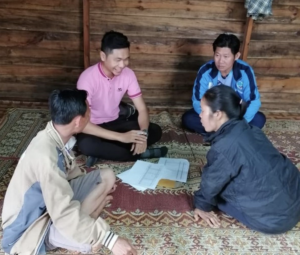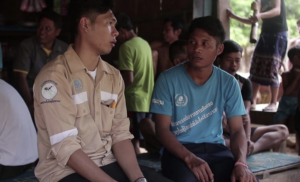Project
Strengthening Inclusive & Equitable Community-led Health Care for Lao Ethnic Minorities
-
Amount Funded
191,917 EUROProject Duration
01 Oct 2018 - 30 Sep 2020 -
-
Lead organisation
-
The Population Education and Development Association (PEDA) is a registered civil society organisation, implementing community education and development programmes throughout Lao PDR. In operation since 2001, PEDA designs and delivers behaviour change communication and education programmes in the areas of preventative healthcare, human trafficking, drug use and sustainable livelihood development.
PEDA partners with community leaders, grassroots organisations, ethnic minorities, rural and disadvantaged communities, and groups at risk such as women, female sex workers, school children and vulnerable youth.
-
Organisation
The Population Education and Development Association (PEDA) is a registered civil society organisation, implementing community education and development programmes throughout Lao PDR. In operation since 2001, PEDA designs and delivers behaviour change communication and education programmes in the areas of preventative healthcare, human trafficking, drug use and sustainable livelihood development.
PEDA partners with community leaders, grassroots organisations, ethnic minorities, rural and disadvantaged communities, and groups at risk such as women, female sex workers, school children and vulnerable youth.
-
Project
The project Strengthening Inclusive & Equitable Community-led Health Care for Lao Ethnic Minorities implements a community-based approach to detect and manage malaria cases in combination with a comprehensive package of prevention, case finding, referrals and follow up. In addition behaviour change communication and advocacy, communication and social mobilisation techniques are cooperatively used to increase the knowledge of malaria and associated issues, and to promote the use of artemisinin-based combination therapy (ACT) and Rapid Diagnostic tests (RDTs) as well as timely health care seeking behaviour for ethnic minority groups living in 50 villages of three districts in Sekong province. The PEDA project model focuses on three districts of Sekong namely Kaluem, Lamam and Thateng which are considered to have a high malaria burden. 50 Village Malaria Workers are selected from three villages in the targeted districts. Under the guidance of the national programme, PEDA uses the comprehensive package of community-based interventions including integrated community case management delivered by Village Malaria Workers and mobile community outreach team (Test & Treat) to intensify active malaria case detection, management, referral and surveillance in community and high risk groups such as household and families living with malaria cases, forest workers, ethnic groups and Mobile Migrant Population. The community system strengthening through community leader advocacy is also integrated into the package in terms of linking the community to the health services effectively. This approach also aligns within the malaria National Strategic Plan 2016-2020 by focusing on malaria active case detection and management, community system/linkages strengthening, aiming to step forwards to sustainable malaria case management and elimination by 2030.
-
-
The project Strengthening Inclusive & Equitable Community-led Health Care for Lao Ethnic Minorities implements a community-based approach to detect and manage malaria cases in combination with a comprehensive package of prevention, case finding, referrals and follow up. In addition behaviour change communication and advocacy, communication and social mobilisation techniques are cooperatively used to increase the knowledge of malaria and associated issues, and to promote the use of artemisinin-based combination therapy (ACT) and Rapid Diagnostic tests (RDTs) as well as timely health care seeking behaviour for ethnic minority groups living in 50 villages of three districts in Sekong province. The PEDA project model focuses on three districts of Sekong namely Kaluem, Lamam and Thateng which are considered to have a high malaria burden. 50 Village Malaria Workers are selected from three villages in the targeted districts. Under the guidance of the national programme, PEDA uses the comprehensive package of community-based interventions including integrated community case management delivered by Village Malaria Workers and mobile community outreach team (Test & Treat) to intensify active malaria case detection, management, referral and surveillance in community and high risk groups such as household and families living with malaria cases, forest workers, ethnic groups and Mobile Migrant Population. The community system strengthening through community leader advocacy is also integrated into the package in terms of linking the community to the health services effectively. This approach also aligns within the malaria National Strategic Plan 2016-2020 by focusing on malaria active case detection and management, community system/linkages strengthening, aiming to step forwards to sustainable malaria case management and elimination by 2030.
-
All key project interventions were completed on time, and community outreach was carried out on a regular basis from the first quarter of 2019 to the last quarter of 2020. The Community Change Agents (CCA) actively conducted outreach mobilisation for their community members from the beginning of the project implementation, providing correct information on malaria prevention and access to health services, while intensifying malaria active case detection and management in combination with a comprehensive package of prevention, case finding, referral linkages and follow-up.
Over the course of the project’s life cycle, over 3,704 community members (1,864 female) in the 50 target villages were reached and given accurate information on malaria prevention and treatment via community outreach mobilisation activities. The CCA covered a total of 20,690 people (10,024 female). Malaria testing was recommended for 1,678 people (580 female) at the nearest health centres and district hospitals. Malaria was found in 32 people (15 female) who were referred to health clinics and hospitals. Villagers in the 60 target villages shifted their health-care behaviour from incorrect practices such as animistic rituals and self-diagnosis to going to health centres for treatment. In terms of documenting these changes, four video clips were created, each demonstrating positive changes in the communities in terms of malaria prevention, care, and treatment.






